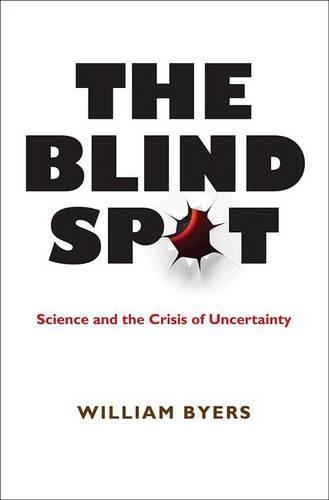Overview
In today's unpredictable and chaotic world, we look to science to provide certainty and answers--and often blame it when things go wrong. The Blind Spot reveals why our faith in scientific certainty is a dangerous illusion, and how only by embracing science's inherent ambiguities and paradoxes can we truly appreciate its beauty and harness its potential. Crackling with insights into our most perplexing contemporary dilemmas, from climate change to the global financial meltdown, this book challenges our most sacredly held beliefs about science, technology, and progress. At the same time, it shows how the secret to better science can be found where we least expect it--in the uncertain, the ambiguous, and the inevitably unpredictable. William Byers explains why the subjective element in scientific inquiry is in fact what makes it so dynamic, and deftly balances the need for certainty and rigor in science with the equally important need for creativity, freedom, and downright wonder.Drawing on an array of fascinating examples--from Wall Street's overreliance on algorithms to provide certainty in uncertain markets, to undecidable problems in mathematics and computer science, to Georg Cantor's paradoxical but true assertion about infinity--Byers demonstrates how we can and must learn from the existence of blind spots in our scientific and mathematical understanding. The Blind Spot offers an entirely new way of thinking about science, one that highlights its strengths and limitations, its unrealized promise, and, above all, its unavoidable ambiguity. It also points to a more sophisticated approach to the most intractable problems of our time.
Full Product Details
Author: William Byers
Publisher: Princeton University Press
Imprint: Princeton University Press
Dimensions:
Width: 15.20cm
, Height: 2.00cm
, Length: 23.50cm
Weight: 0.369kg
ISBN: 9780691146843
ISBN 10: 0691146845
Pages: 240
Publication Date: 17 April 2011
Audience:
College/higher education
,
Professional and scholarly
,
General/trade
,
Tertiary & Higher Education
,
Professional & Vocational
Format: Hardback
Publisher's Status: Active
Availability: Temporarily unavailable

The supplier advises that this item is temporarily unavailable. It will be ordered for you and placed on backorder. Once it does come back in stock, we will ship it out to you.
Language: English
Reviews
Is the idea that anything can be determined with absolute certainty an illusion? ... Byers incorporates many brilliant thinkers and seminal scientific breakthroughs into his discussion, offering the cogent, invigorating argument that only by embracing uncertainty can we truly progress. -- Kirkus Reviews
Science has been under siege during the last quarter century, first by critics who charge that science itself is a cultural construct and that scientists import their own belief systems into their research. Retired math professor Byers (How Mathematicians Think) argues that much of the problem lies in what he calls the 'science of certainty.' ... Instead, Byers says, scientists need to recognize 'uncertainty, incompleteness, and ambiguity, the ungraspable, the blind spot, or the limits to reason.' -- Publishers Weekly Is the idea that anything can be determined with absolute certainty an illusion? ... Byers incorporates many brilliant thinkers and seminal scientific breakthroughs into his discussion, offering the cogent, invigorating argument that only by embracing uncertainty can we truly progress. -- Kirkus Reviews Science deals in certainties, right? Wrong, says Montreal-based mathematician William Byers... He contends that this view is wide of the mark and dangerous, influenced by the human need for everything to be 'certain'. -- Alison Flood, Wired
Science has been under siege during the last quarter century, first by critics who charge that science itself is a cultural construct and that scientists import their own belief systems into their research. Retired math professor Byers (How Mathematicians Think) argues that much of the problem lies in what he calls the 'science of certainty.' ... Instead, Byers says, scientists need to recognize 'uncertainty, incompleteness, and ambiguity, the ungraspable, the blind spot, or the limits to reason.' -- Publishers Weekly Is the idea that anything can be determined with absolute certainty an illusion? ... Byers incorporates many brilliant thinkers and seminal scientific breakthroughs into his discussion, offering the cogent, invigorating argument that only by embracing uncertainty can we truly progress. -- Kirkus Reviews Science deals in certainties, right? Wrong, says Montreal-based mathematician William Byers... He contends that this view is wide of the mark and dangerous, influenced by the human need for everything to be 'certain'. -- Alison Flood, Wired I've sometimes remarked that I think our educational system would benefit if we threw Shakespeare in the trash bin, but required all high-schoolers to read Godel and Cantor (well, their interpreters) ... or perhaps now, just substitute Byers! ... [The Blind Spot] should be read and contemplated by every scientist ... and even applied to their own endeavors. -- Math-Frolic! A passionate, informed manifesto that takes aim at our culture's reigning myth of scientific certainty. Byers would like to debunk that myth, and put in its place a science of wonder that freely acknowledges its 'blind spot'--a metaphor for all that remains inherently and irreducibly unknowable, ambiguous, and mysterious... The Blind Spot is an important book for our time, part of a necessary and pressing debate about how to think, and live, within limits both certain and otherwise. -- Alex Good, Quill & Quire [The Blind Spot] is an enjoyable read and makes several interesting points. -- Choice
Author Information
William Byers is professor emeritus of mathematics and statistics at Concordia University in Montreal. He is the author of How Mathematicians Think: Using Ambiguity, Contradiction, and Paradox to Create Mathematics (Princeton).




